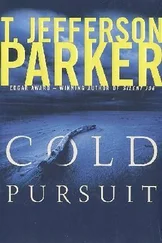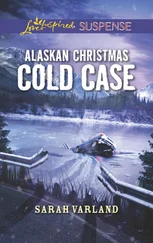“Thanks.”
“So you can continue. I’ll take the first shift up on the load.” He began to put on his outer clothing.
“How do we do this?”
Hilario’s voice was muffled somewhat as he pulled on his neck gaiter and rigged into his parka. “The Challenger leads the way as usual, but you follow slower now. I throw a flag down off the load every two hundred feet.” He swung his right arm like a javelin thrower.
Dave had climbed off his snow machine and was swapping his hood for a watch cap and his goggles for sunglasses with side protection flaps. He came over to the Delta, opened the door behind Hilario, reached under the backseat, pulled out two heavy iron rods with beveled points, dragged both irons over to where the snowmobiles were parked, and leaned one across each saddle.
Hilario said, “They use those pikes to jab holes in the snow so they can stick the poles in. You’ll see. Don’t get too far in front of them.” Pulling the zipper to his chin, he climbed out the door, walked along the running boards and over the boxy fender that covered the wheel on that side, then stepped over the swivel that connected the tractor and trailer parts of the vehicle. Up on top of the load, he loosened the ties on the first bundle of flags and used the bamboo end of one of them to tap the roof of the cab, indicating that Valena could begin.
Valena eased the Delta into first gear and set it rolling. In the side rearview window, she watched the bamboo poles fly out every two hundred feet. Some landed upright in the snow or leaning at an angle; others, fell in places where the snow had blown away, baring the ice underneath, and simply bounced and skittered across the surface.
Dave and Wee Willy leapfrogged along behind her, setting flags turn and turn about, zooming from one position to the next, carrying their steel pikes like lancers at a joust.
As she drove along, Valena reminded herself that Antarctica was a desert. In the interior, annual precipitation averaged less than two inches of water, whatever that taped out to in snowflakes. Even here on the coast, where the snowfall was highest, it averaged less than eight inches. And yet the wind had rounded it all up and dumped it here, accumulating a thickness of five or six feet in a year. Was Emmett Vanderzee’s high camp like this? Had the wind helped a killer bury the parachute drop?
Valena felt the morning’s nervousness settle about her once again. She struggled to look on the landscape intellectually, as an object from her classes. Here the wind packed the snow hard, transforming it into solid ice in just a few seasons. Images filled her mind from the photomicroscopic slides Emmett Vanderzee had shown in his lecture during spring term. As the snowflakes accumulated in this perpetual deep freeze, they recrystallized into shards of granular snow. The shards then compacted, changing from snow into a more granular substance called firn. As additional snow accumulated on top, increasing the load, firn transitioned into ice, reforming into larger and larger crystals, finally interlocking into the massive ice of glaciers. She had read about this transition, and now she witnessed the result of the process in its immensity. Back home, glaciers were little things that lived in the high valleys of just a few mountain ranges, the exception to the rule. Here, ice was the rule, not the mountains it shrouded, and it formed not just alpine glaciers but huge glaciers and ice streams miles wide that flowed from the gigantic sheets of ice thousands of feet thick. The Ross Ice Shelf was as big as France. It was fed by the West Antarctic Ice Sheet, a mass half the size of the United States, and also by the East Antarctic Ice Sheet—larger than the whole lower forty-eight states by a considerable margin—which flowed through passes in the Transantarctic Mountains down which the monstrous glaciers flowed—in places, the ice in Antarctica was more than three miles thick. The sheer volume of all that bound-up water was beyond imagining, ninety percent of the world’s ice, seventy percent of the world’s fresh water.
As she rolled Flipper slowly along the trail, Valena stared out across the white wilderness. The variation in the patterns the wind carved into the snow and ice was fantastic. Here the surface snow and firn was sculpted into overlapping fish scales the size of her boot, there into waves as big as the Delta. Sastrugi , the Russians had named these endlessly variable sculptures; an alien name for alien forms.
Wee Willy pulled his snow machine to a halt in front of her and waved his arms for her to stop. She pulled up and rolled down the window, catching a blast of scouring wind in her face.
“I been out here for hours. Your turn,” he demanded, pulling down his neck gaiter to speak.
Valena thought for only a second before deciding that she was only too ready to agree. She was enjoying driving the ponderous Flipper but envied the speed and maneuverability of the snow machines. In all her twenty-four years she had never ridden one (“You’ll end up like your ma,” Great Aunt Dilla had always said), and this was a grand way to start. “I’ll be right down,” she replied, and she began the process of layering on clothing to guard against the cold.
As she climbed down out of the cab of the Delta, she told Wee Willy, “I put your hand warmer into the top of your duffel. It had fallen onto the floor, and I was certain you didn’t want it to get dirty.”
Wee Willy had been on a trajectory to trudge past her without making eye contact, but at her words he stopped, turned, and looked at her, his lips slightly parted. He stared for several seconds, then said, “Thanks.” He began to move toward the Delta again, but stopped again, turned to her, and said, “Remember to lift with your legs. It’s heavy.”
“The pike?”
“Yeah. Lift with your legs, then drop it into the snow. That way you don’t hurt your back. And lay it across your lap while you drive to the next flag. If you try and put one end of it down on the running board and you hit a bump, it can fall off into the snow.”
“Thanks.” She took a seat on the snow machine Wee Willy had just vacated.
Hilario called out from the back of the Delta. “How about I take a turn on the snow machines, too?” he asked.
Edith had seen them stop and had looped around to rejoin them. “Dave, you want a turn on the Challenger?” she called out from its cab. “I’ll take a turn on top of the load.”
Dave gave her a thumbs-up, set his machine to idle, and headed for the tractor.
“But first give Valena the ten-second lowdown on driving a snow machine, will ya?”
Dave turned and crossed to Valena’s snow machine. “Just turn the switch on the ignition and give it some gas,” he said. “Should come right on. It’s warm.”
“Thanks,” she said. She sat down quickly on the saddle and fired it up, then zoomed off down the trail, knowing that her haste was a little ridiculous, considering that there were as yet no new flags waiting to be set, but she wanted to show him that she could handle it. To her surprise and pleasure, she felt quite natural on it. Her hips rolled with the changes in the surface and, even as fast as she was going, she could feel the wind pressing at her back. When she thought she had gone about four hundred feet—two flag distances—she stopped the machine and waited.
The Challenger swept past her with Dave at the controls. He waved to her.
The Delta came lumbering down the trail with Wee Willy at the wheel. Edith tossed down a flag, and Valena hopped up and dropped the iron into the snow, lifted it out, and set the bamboo pole into the hole as the Delta continued down the trail. Sitting back down on the saddle with the iron across her lap as Wee Willy had suggested, she throttled up and zoomed off to the next position, where another flag already waited.
Читать дальше












